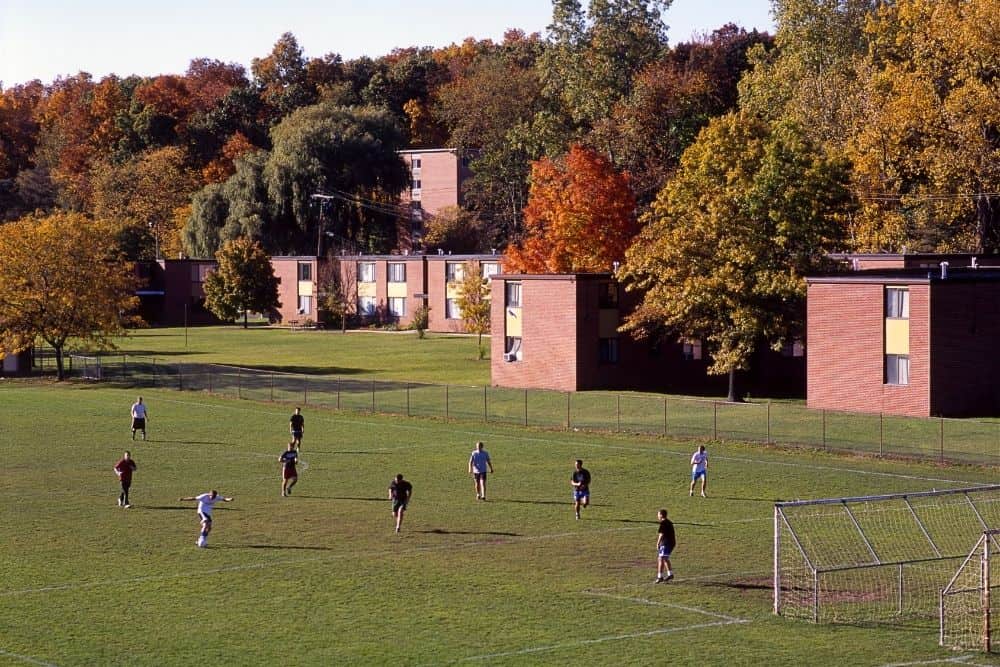In the US, prospective soccer players who are looking to go pro are provided the opportunity to train and also earn a college degree. Soccer, being a multibillion-dollar industry, has greatly evolved over the years to become a sort-after career choice for people in sport.
There are provisions for students who want to study soccer in college. It usually starts in High School where they have school teams and local travel teams for students. It is usually one of the ways to get into collegiate soccer programs if a player shows exceptional skills and abilities.
There are many colleges currently offering courses in their soccer programs. In addition to this, students who are looking to become professional soccer players can take advantage of soccer scholarship programs. In this article, we’ll help shed more light on college soccer and all that it entails.

Can You Go To College For Soccer?
Yes, you can. Undeniably, it could be tough but with the right amount of determination and commitment, it can be a great start to your journey to becoming a professional soccer player.
Some professional soccer players who play in some of the world’s top leagues started from playing college soccer. These colleges and universities often have teams in their soccer programs made up solely of players enrolled in the school.
These institutions provide full-time coaches and staff to help train and build up these student players.
These college soccer teams compete in various conference and non-conference tournament games. At the end of the collegiate years, top players often continue their careers in reputable leagues in the US – like the Major League Soccer (MLS) and National Women’s Soccer League (NWSL) – or other leagues around the world.
Just as with any college or university, you need to understand that being accepted into reputable soccer colleges will require a higher level of skill and experience from you. So it’s advisable to prepare adequately and score your ability if you don’t want to be turned down as a failure.
Why you should consider college for soccer?
Unlike many decades ago when soccer was viewed simply as a sport for entertainment and leisure, there have been many reasons – in recent times – why it has become profitable to invest in college soccer. Going to college for soccer not only prepares you for your professional soccer journey but also enables you to obtain a university degree.
With the level of awareness, the sport has gained, colleges readily offer scholarships to students. It is on record that more than 150,000 college student-athletes are eligible to receive different forms of scholarships worth about $2.9 billion.
There is a guarantee of being a part of an elite-level sport that’s well funded. Minus the fantastic facilities it enjoys, it has a large fan base and following. This, no doubt, offers successful student player fame.

Why you should not go to college for soccer?
Having the skills and talent is a necessity to take soccer to a professional level but when you consider going to college to improve yourself, it becomes much more than just training sessions.
As a prospective college soccer athlete, it is important you must have an understanding of how to balance academics and soccer.
Although colleges provide adequate academic support to their student-athletes, you have to be intentional in balancing your soccer dream and academics. You should also strive to excel as a soccer player too.
College soccer programs require the student-athlete to take a minimum number of courses each semester. Students are advised to spend at least 2-3 hours weekly studying and not to spend more than 20 hours on soccer training.
Many college soccer players never make it to the professional level. For someone with a dream to go pro in soccer, college soccer can be a hindrance if not drafted for professional leagues.
When should you go to college for soccer?
Soccer, as a professional sport, has an age cap. A player’s ability and overall performance begin to diminish with age; soccer academies usually target players from 13-18 years.
When it comes to college soccer, the average age is 18. If you have had a dream to be a professional soccer player, you can start from high school or enroll in a college or university that offers college soccer programs.
Where to go to college for soccer?
There are more than 1,400 colleges and universities that currently offer college soccer programs. We would exhaust this article to name them all. It’s best to start by checking if your preferred college has a college soccer program. Also, note that there are various levels of soccer in college to choose from. Depending on the level you would want to start from, there are the 5 major levels of college soccer:
- NCAA Division 1 Soccer – this has 204 men’s team and 322 women’s team
- NCAA Division 2 Soccer – this has 181 men’s team and 228 women’s team
- NCAA Division 3 Soccer – it has 428 men’s team and 407 women’s team
- NAIA Soccer – it has 218 men’s team and 219 women’s team
- Junior College Soccer – this has 221 men’s team and 186 women’s team
How to Get Into Soccer Colleges?
Soccer colleges are not just regular soccer camps where soccer skills and talent is all that is required. Getting into a soccer college goes a little bit beyond that.
- Make a list – there are too many colleges offering soccer programs to choose from. It is best to make a list of those colleges that fit into your preference
- Educate yourself about the selected colleges – there must have been a reason you put down the names of those colleges. Now, this goes beyond the superficial. Get to know about each of their soccer programs to see if they meet your goals and aspirations
- Make contact – if you have had a very successful soccer career in high school, chances are you have a stronger resume than someone who hasn’t. This shouldn’t hinder you from reaching out to the college soccer program coach. Send a letter of interest highlighting your experience and accomplishments/awards. Include your resume, and if you feel it is equally important, include an unedited 15-minute video showcasing your soccer highlights and skills
- Be academically outstanding – don’t let anyone tell you otherwise; grades are as important as skills when trying to get into soccer colleges. You must always remember you are first of all a student before a soccer athlete
Pros and Cons of Playing Soccer in College
Soccer in college can be a dream come true for many students. However, like most things in life, it comes with its pros and cons.
Pros
- It improves your resume
What better way to show future employers (assuming you don’t go to become a professional soccer player) that you can effectively balance work and extra activities. Many people do not realize the level of management skills it takes to balance academics and college soccer without compromising on any of them.
- Builds relationships with others
Playing soccer in college means you can’t go solo. Soccer is a team sport and requires a whole lot of trust and bonds to be a successful team.
As a college athlete, you would be required to manage and maintain relationships with your professors, coach, coaching staff, classmates, and teammates.
- You gain valuable life experience
Teamwork, time management, adaptation, risk-taking, leadership skills, selflessness, work ethic, etc., are a few of the invaluable life experiences college soccer exposes you to.
- Financial assistance
Soccer players in college enjoy scholarship privileges or part payment of their school fees. Moreover, you can also earn from high-performance academies as a student. This is one of the major reasons most people jump into soccer colleges. It is a win-win situation if you play your cards well.
- Enhancing Physical Fitness and Basic Skills
You can’t play soccer and stay unhealthy. Soccer players in college go through rigorous training that keeps them in shape. As part of their training exercises, they run for a particular distance, sprint, lift weights, etc. This helps them develop the muscles needed to compete successfully at every level of the sport.
- Exposure and experiences
College soccer teams compete yearly in conference and non-conference tournaments. This would mean it will avail student-athletes the opportunity to tour the country. It is a good opportunity for players to meet soccer scouts and recruits anywhere in the country.
Cons
- Managing soccer and academics is a difficult task
Your academic performance as a college soccer player should be paramount if you intend to get good grades. Otherwise, you could get benched during matches or lose your place in the team. Exam problems, classes, and other academic issues might make it tough to remain committed.
- Prone to injury
College soccer only exposes you to imminent injuries. Along the line, you might experience broken bones, concussions, minor sprains, etc., which might be adverse to your academics and playing on the pitch.
Is College Soccer Hard To Get Into?
Getting into college soccer can be hard especially among the top soccer divisions because it’s highly competitive.
Talent and having good grades just don’t cut it alone. Remember you’re competing with a large number of people who are probably offering what you have. It is important to take it a step further by taking the recruitment process seriously.
We already highlighted some steps to stand out and initiate your recruitment process. In addition to how to scale through your recruiting process, ensure you follow these tips:
- Fill out each soccer questionnaire completely
There’s a questionnaire on each team website in every college soccer team division, for a prospective student to fill. This allows coaches to know the kind of students they will recruit. This should be done as early as possible to make the coaches aware of your interest in their soccer program.
- Always present your tournament showcase schedule to coaches
This allows coaches to know your skills and abilities during tournaments, and allow them to watch you. It is important to let them know your soccer schedule as early as possible.
- Maintain a consistent and timely response
Always follow up with the college coach via emails even if he/she hasn’t replied as soon as you would have expected – coaches get a lot of recruitment emails and may take time to get to yours. As a rule of thumb, always maintain communication with the coaches, with regards to your soccer recruitment, and less communication with your parents.
- Enroll in college ID camps
This is the most famous method for coaches to discover recruits because it enables them to watch players over a 2-4 day timeframe in various situations. They analyze the players in various formations and positions to ascertain their output and adaptation level.
Conclusion
College soccer is a great way to begin your journey as a professional soccer player. The benefits far outweigh its cons. It is an ideal way to earn an academic degree while also following your dream to play in the world’s best soccer leagues.
Getting into these soccer colleges may not be as easy as one would want it to be but in the end, it is worth the opportunity. Begin your recruitment process today by making a list of soccer colleges you’ll like to attend.
Hi there, I’m Jay.
Soccer is everything in my life! My friends and I have created this blog with all our enthusiasm, passion, and understanding after years of playing pro soccer. Hope you will enjoy it!
